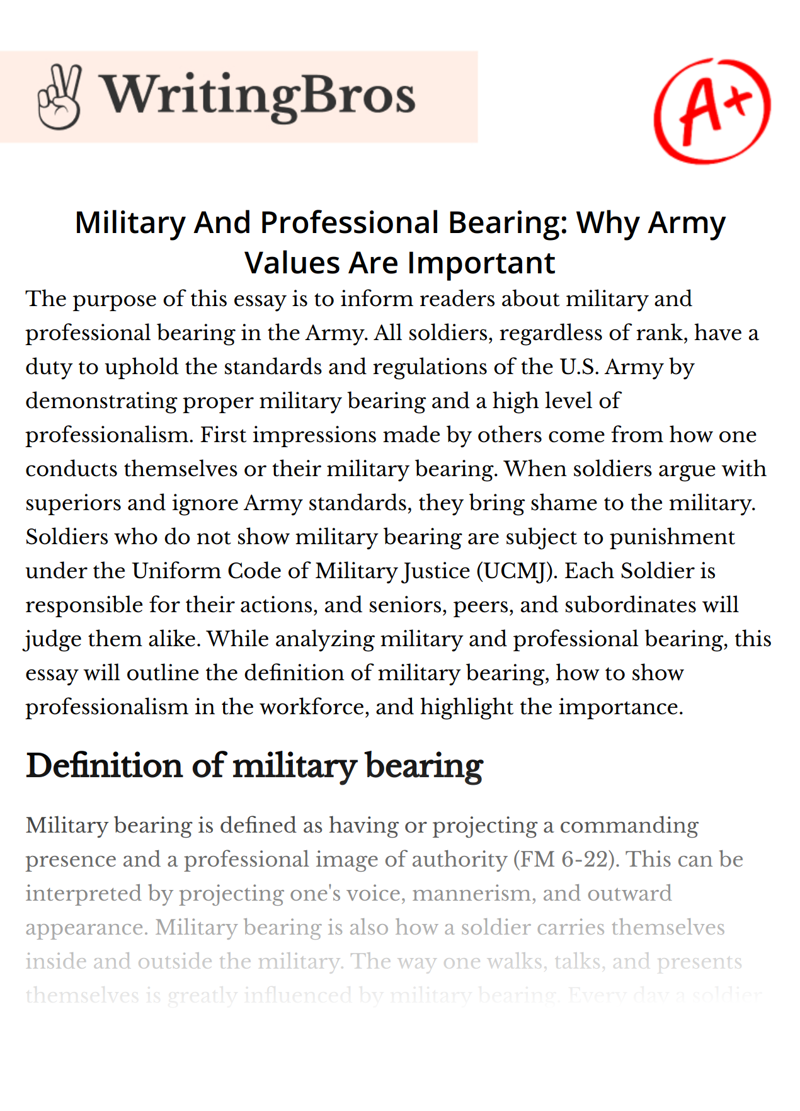Military And Professional Bearing: Why Army Values Are Important

Table of contents
- Definition of military bearing
- Military professionalism
- References
The purpose of this essay is to inform readers about military and professional bearing in the Army. All soldiers, regardless of rank, have a duty to uphold the standards and regulations of the U.S. Army by demonstrating proper military bearing and a high level of professionalism. First impressions made by others come from how one conducts themselves or their military bearing. When soldiers argue with superiors and ignore Army standards, they bring shame to the military. Soldiers who do not show military bearing are subject to punishment under the Uniform Code of Military Justice (UCMJ). Each Soldier is responsible for their actions, and seniors, peers, and subordinates will judge them alike. While analyzing military and professional bearing, this essay will outline the definition of military bearing, how to show professionalism in the workforce, and highlight the importance.
Definition of military bearing
Military bearing is defined as having or projecting a commanding presence and a professional image of authority (FM 6-22). This can be interpreted by projecting one's voice, mannerism, and outward appearance. Military bearing is also how a soldier carries themselves inside and outside the military. The way one walks, talks, and presents themselves is greatly influenced by military bearing. Every day a soldier comes to work, their subordinates should see a sharp uniform, clean haircut, and positive motivation from them. This will show that they take pride in their appearance and have great self-discipline. In front of seniors, they should be able to hold their composure and keep emotions constantly in check. Good discipline and ethics make up who soldiers are, and every soldier must practice military bearing. It is what separates them from their peers and makes them an outstanding U.S. Army Soldier.
Military professionalism
Demonstrating professionalism is an everyday task, and soldiers and leaders can do this by living by the seven Army values of loyalty, duty, respect, selfless service, honor, integrity, and personal courage. These values are the core of the profession as soldiers in the Army and what make them professionals in everything they do. Leading by example is another great way of showing true professionalism. As Bruna Martinuzzi said, "When you lead by example, you create a picture of what's possible. You make it easy for others to follow you." Soldiers tend to be easily influenced by actions, and when leading by example, soldiers need to show them what is right. They have to become competent leaders capable of tackling any mission to prove to their soldiers that they have the confidence to lead them. Having this level of professionalism will make soldiers want to follow their leaders.
In the Army, it is important to have military and professional bearing to bring credit and pride upon oneself and their units. Living by the NCO Creed, "I am proud of the corps of noncommissioned officers and will at all times conduct myself so as to bring credit upon the corps, the military service and my country," shows that professionalism is deeply rooted inside. Soldiers and others will be astounded by one's presence, and it can empower them to try to follow one's example. This will inspire units to improve, and soon the Army as a whole. Soon other nations will look at the U.S. Army in astonishment at how professional its soldiers are. As "Military Bearing - Projecting Confidence and a Command Presence" states, "An Army's ability to fight and win its nation's wars is not solely dependent on weapons and training alone. It also rests on the attitude or climate of units, leaders, and soldiers."
In summary, military and professional bearing are crucial aspects of being a successful soldier in the US Army. Demonstrating military bearing, projecting confidence, and presenting a professional image are critical to building respect, maintaining discipline, and upholding the Army's standards and regulations. A soldier's professionalism is essential, and it should be evident in their everyday life and leadership. By adhering to the Army values, setting a positive example, and showing respect for traditions and customs, soldiers can demonstrate their commitment to excellence and motivate their peers and subordinates to follow suit. A strong sense of military bearing will help soldiers to succeed in their careers, earn respect from others, and contribute to the success of their unit and the Army as a whole.
References
- U.S. Army. (2017). ADP 6-22 Army Leadership and the Profession. https://armypubs.army.mil/epubs/DR_pubs/DR_a/pdf/web/ARN17424_ADP%206-22%20C1%20FINAL%20WEB.pdf
- U.S. Army. (2020). AR 600-20 Army Command Policy. https://armypubs.army.mil/epubs/DR_pubs/DR_a/pdf/web/ARN20471_AR600-20_FINAL_WEB.pdf
- U.S. Army. (2022). FM 6-22 Leader Development. https://armypubs.army.mil/epubs/DR_pubs/DR_a/pdf/web/ARN3160_FM%206-22%20C1%20FINAL%20WEB.pdf
- Center for Army Leadership. (2019). Army Leadership: Competent, Confident, and Agile. https://www.casl.army.mil/CASLContent/Publications/Army%20Leadership%20Competent%20Confident%20and%20Agile.pdf
- Dunaway, M. W. (2019). Military Bearing and Discipline: A Comparative Analysis of the United States Army and Its Foreign Counterparts. U.S. Army Command and General Staff College.
- Martinuzzi, B. (2013). How to Demonstrate Your Professionalism. American Management Association. https://playbook.amanet.org/how-to-demonstrate-your-professionalism/
Cite this Essay
To export a reference to this article please select a referencing style below

